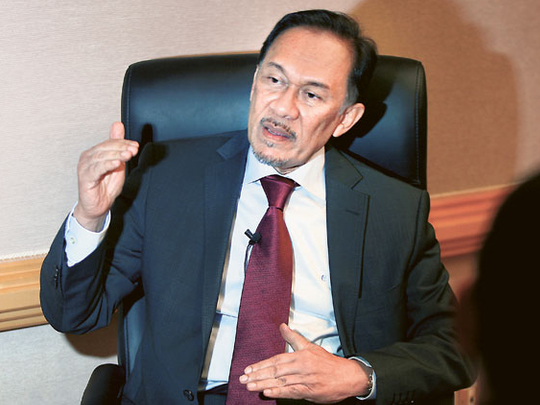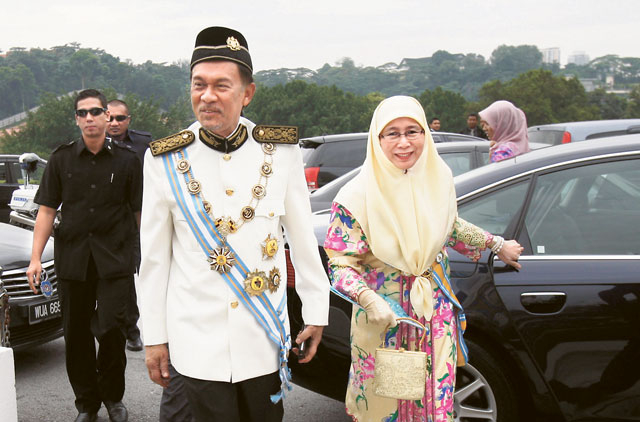
Anwar Ebrahim could potentially become the man who unseats Malaysia's ruling party, which has dominated the political scene for five decades. He is certainly a controversial politician. He has a very quiet demeanour, yet you can't help but notice his charisma. His story should be familiar to most: When he was the deputy prime minister in the late Nineties, he fell out with his boss, former prime minister Mahathir Mohammad, and spent six years in prison for corruption and then in 2010 faced charges of sodomy. He has persevered under pressure and pushed through to now become the leading opposition candidate in his country. Many would not be surprised if he becomes the next prime minister. That is if any more charges don't come his way.
Ebrahim was in Dubai recently to attend the 20th Public Relations World Congress conference where he also gave the keynote address. Speaking to Weekend Review exclusively, he discussed Malaysia's main challenges and shared his thoughts on how his country can take the next step to leading the region.
So, have the previous harassment charges fazed him? Not really, and when asked if he expected any more charges, he says, "Not that I know of, but you can discount this." This is because he considers those charges a form of political harassment by the ruling party. His first experience with the law came in 1998, when he was dismissed from his cabinet posts and convicted of corruption (for which he served the six years) and sodomy, which was later overturned. In 2008, he was charged again with sodomy; he was tried in 2010 and 2011 and, in January this year, was acquitted. These experiences have convinced him that Malaysia is in urgent need of judicial reform and an independent media.
Ebrahim says the latest sodomy case was "a pleasant surprise" because the entire process was fraudulent. It went against all standard legal procedures. "The charge was entertained without medical notes, evidence was fabricated, and this was tolerated by the judge," he laments. It was "divine intervention", he says, that won him an acquittal.
Even during the trial, his focus was always on the need for political change through the electoral process. "The laws are archaic and the system is still oppressive in Malaysia," he says.
‘Enemies' all around
The picture Ebrahim paints of Malaysia is a very dark one: stringent policies, business deals given to certain well-connected families and cronies and a very restricted media (which nicely offsets his image as the leading figure for reform). This, of course, is an indication of his campaign platform and he is adamant that change has to come to his country. Even though Malaysia had a much better starting point and infrastructure than most developing economies, he argues, it still lost out in terms of competitiveness precisely because of poor governance and corruption.
Ebrahim, who rarely gets coverage in the Malaysian media, recently faced a bout of criticism over an Israel-related statement he made, which he says was taken out of context. In an interview with The Wall Street Journal, he was asked: "As a moderate Muslim, you have exchanges with your friends in the Arab world and Muslim parties in the West; then why are you so blatantly anti-Israel?"
His answer: "You should rephrase your question adding, ‘Why is Israel continuing its aggression and occupation, and atrocities against Palestinians?' If this stops and Israel recognises the legitimate aspirations of the Palestinians, I don't have a problem recognising Israel or protecting the security of Israel."
According to him, the media in Malaysia deleted all his references to Palestine and instead focused on his remarks on Israel — its recognition and security. Ebrahim has since spoken to his country's parliament and clarified his position, but he says the national media doesn't report this. In such cases, though, he never underestimates people's wisdom and their ability to differentiate truth from fiction.
In fact, it was Mahathir Mohammad, he says, who "wrote letters to three Israeli prime ministers and kept it a secret". But, be it as a minister or acting prime minister, Ebrahim says he never had any dealings with Israel. He contends, though, that "one should not [rule it out] if it is a matter of principle, for example, representing the Palestinian position or negotiating."
He also described how the national media in his country is out to malign him.
In an interview he once gave to the BBC, he was asked about sodomy laws. His answer: "Muslims and majority of non-Muslims in Malaysia accept the sanctity of the institution of marriage between man and woman notwithstanding the present archaic laws." The national media deleted the first part of the remark and just played up the second to show that he now promotes homosexuality.
It is not difficult to sympathise with Ebrahim as he narrates these stories, but if he wants to succeed in the next elections, his relationship with the media has got to change. After all, he is very keen to challenge the status quo and move the country into a new phase.
Asked about his chances of running against a very dominant ruling party if elections are called this year (they are due to be held at the end of next year but are likely to take place well before that), Ebrahim jokingly tells me that he needs my advice. He is convinced that when for decades people have been exposed to "vicious and incessant propaganda", they tend to mature and become more cynical of a government-controlled media that doesn't leave any room for an alternative view. So he says, there is a window of opportunity. Social networks (Facebook and Twitter accounts) have also helped him counter this. But he admits social media in Malaysia has its limitations: "It is not the rural hotline."
Freedom and corruption
What about his coalition (he is the leader of Pakatan Rakyat, the three-party opposition coalition)?
He admits it is proving to be a challenge but says his coalition is pre-election, not post-election — it hasn't been tested yet. It is reasonable to expect people to demand that the coalition must have certain principles and policies and not just politics of convenience and expediency. "We took a year to formulate our various policies on rule of law, economics, gender equality and freedom of conscience," he says. The coalition is rather diverse; it has Muslims, a Christian Buddhist party, and the ethnic Chinese party. Moreover, there is an agreement on key policies.
Ebrahim finds it easy to identify his supporters: "Malaysia has been abandoned for more than half a century … My supporters believe the country needs to mature and respect freedom and human rights," he explains. Despite being an oil-producing country, they ask, why is it not doing as well as some of its neighbours? Why is the income disparity so glaring and corruption so endemic? According to recent surveys, the Malaysian people's main concerns are economic (poor wages, unemployment and corruption).
So Malaysia's political system needs a lot of work and can learn a thing or two from Indonesia and Turkey, both of which are Muslim countries.
"Malaysia is behind not because of religion," Ebrahim says. "Those in the ruling party often say that they don't want American democracy, because they'd then have to legalise prostitution and have people walking naked in the street." But the issue, he says, is basic freedom. (During his recent teaching stint in the United States, Ebrahim says he never saw naked people on the streets!) Ironically, he feels this is backed by the West. "You can't condone human rights abuses or desecration of people's property or faith, or not have gender equality" — which is what he says is happening. But he doesn't see imposing an American system or a British system on Malaysia as ideal or right. The issues of freedom, justice and rule of law are universal, he says, and that should be the focus. "In the Indonesian experience, for example, there was a huge debate on pornography and there were many statements from the West attacking the country for its ‘rigid laws'. This is a situation where you should allow people to decide for themselves ... We cannot [on the other hand] concede the fundamental issue of freedom."
One issue that could prove pivotal in his campaign is of ethnic tensions and how to confront them (the population of Malaysia is multi-ethnic and includes the Muslim Malays, Chinese and Indians). Ebrahim says there isn't a problem among the masses but that it is the ruling party which instigates and condones racist slurs against minorities; for example, the stopping of the distribution of Malay Bibles to the Christians or the restriction of the use of the word "Allah" by Christians — which only happens in Malaysia.
Why are they doing it? They want to strengthen their position among the majority ethnic Malays by showing that they are the true champions of Islam in Malaysia, he says.
Ebrahim has a very busy schedule back home. He goes to parliament during the day and usually after Isha'a prayers, he makes his way to the public halls to speak. People "like to see your face, not Facebook". While it can take a toll on his personal life, he feels it is necessary to stay connected to the people.
He is eager to make a change. He believes his country has a lot more potential and capital and this must be utilised. On his country's foreign policy he says, "We seem to be too subdued by the West, and while I am in favour of having strong relations with the US and the EU, I am not in favour of supporting all US policies, for example, in Afghanistan," where Malaysia can exercise a greater role in persuading the US to tread a different course.
So what is his ideal model? No surprises there that he is enamoured with Turkey, which is democratic and moderate, and tough against corruption. He says he could be biased though, considering he regards Turkish Prime Minister Recep Tayyip Erdogan a personal friend.
Ebrahim seems well aware of the perils and pitfalls of political life in Malaysia. The year 2012 will be decisive and a major test of his popularity. It remains to be seen whether he can put his ideas and plans to practice.













